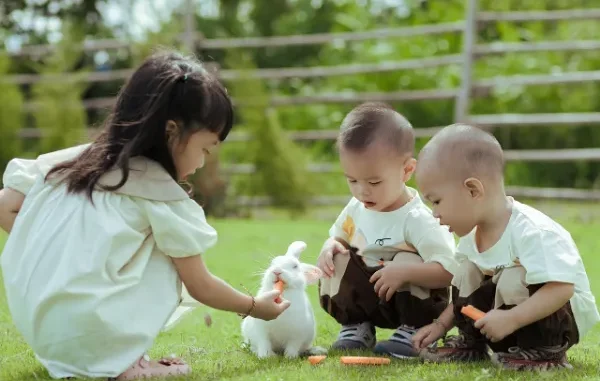
Sending your child to daycare is a big step for any family. Many parents feel a mix of excitement and worry. Will your little one adjust well? Will they be happy and safe? These common feelings are natural, but knowing the many good things daycare offers can help ease your mind. It promises positive growth for your child.
This article explores the deep benefits daycare gives children. It also provides a clear, practical guide for parents. You will learn how to pick the best childcare for your family. Our dual focus helps you understand why quality early care matters so much.
Understanding these benefits helps parents make smart choices. It empowers you to pick a daycare that supports your child’s early education and care. This knowledge is key for their success.

Cognitive and Academic Development Benefits
Early Learning and Skill Acquisition
Daycare in Bourne, MA, provides a structured setting that helps kids learn key academic skills. Children get early exposure to reading and stories. They also learn basic math ideas like counting and shapes. Play-based learning lets them solve problems in fun ways. Many daycares use age-appropriate lessons that fit small children.
Enhanced Social and Emotional Intelligence
Kids in daycare learn important social skills by being with peers and adults. They learn to share toys, work together, and even how to solve small disagreements. This helps them understand what others feel and see things from different sides. Being in a caring environment builds a child’s confidence and helps them become more sure of themselves. Child development experts often say that early peer interactions are vital for building a child’s social and emotional strength.
Improved Language and Communication Skills
A language-rich daycare setting gives children a big boost in their talking skills. They hear many new words and more complex sentences. This helps their own vocabulary grow quickly. Daycare offers lots of chances for kids to talk with teachers and other children. They also learn to listen carefully to others.
Social and Behavioral Advantages
Developing Socialization and Peer Interaction
Daycare helps children learn how to get along in groups. They figure out how to work with others and settle small arguments. Building friendships is a big part of daycare. Kids learn to pick up on social clues, like when someone is sad or happy. For example, a child learns to wait their turn for a favorite toy, understanding patience.
Fostering Independence and Adaptability
Being away from parents helps children become more self-reliant. They learn to follow daily routines and classroom rules. Daycare helps them build simple self-care skills, like washing hands or putting on their jacket. They also get comfortable in new places and situations. This makes them more flexible as they grow.
Positive Behavioral Development
Daycare offers a structured space with trained teachers who guide children’s behavior. Kids learn to control their quick reactions and manage their own actions. They also learn what actions are right in different settings. Studies suggest that children from good early childhood programs may show fewer tough behavioral issues later on.
Health and Well-being Benefits

Establishing Healthy Routines and Habits
Daycare plays a big part in keeping kids healthy. They have regular meal times with healthy food options. Set nap times help children get enough rest. There is also a strong focus on good hygiene, like frequent hand washing. These routines help build good habits for life.
Encouraging Physical Activity and Motor Skills
Daycare settings provide plenty of chances for kids to move and play. Children get to play outside and exercise every day. Activities help them develop both large motor skills, like running and climbing. They also work on small motor skills, such as drawing or cutting with safety scissors. This builds a strong body.
Support for Parents and Family Well-being
Enabling Parental Workforce Participation
Reliable daycare offers practical help for parents’ careers and money matters. It lets parents keep their jobs or go back to school. This helps the family income and provides financial stability. Access to good childcare is a main reason why parents, especially mothers, can stay in the workforce.
Reducing Parental Stress and Enhancing Work-Life Balance
Knowing your child is in a safe and fun place brings great peace of mind. Good childcare eases parents’ daily worries. It means more quality time for family outside of work and childcare tasks. This helps create a better balance between work and home life.
Access to Resources and Support Networks
Daycares can be a great source of information and community for parents. Many offer parent workshops or helpful talks. You can connect with other families and teachers. Daycares may also know about other community help if you need it.
Practical Tips for Selecting the Best Daycare
Define Your Child’s Needs and Your Family’s Priorities
Before you start looking, think about your child. Is your child shy, outgoing, or very energetic? What things are most important to your family? Maybe specific hours, a certain teaching style, or a set location? Also, be clear about your budget for childcare costs.
Research and Shortlist Potential Daycares
Begin by asking friends, family, and coworkers for their suggestions. Use online tools and local directories to find options. Always check if a daycare has the right licenses and any special awards. This initial research helps narrow down your choices quickly.
Visit and Observe Daycare Environments
It is very important to see the daycares in person. Schedule tours during regular operating hours. Watch how the teachers talk to the children. Look at how clean and safe the space feels. What is the general feeling of the place? Always bring a list of questions to ask during your visit.
Evaluate Staff Qualifications and Ratios
Ask about the training, experience, and background checks for all staff members. Understanding the number of children per teacher is key. Childcare experts often say lower child-to-teacher ratios mean better personal attention and safety for each child.
Understand the Curriculum and Daily Schedule
Ask about the daycare’s teaching ideas. Do they use Montessori, Reggio Emilia, or a play-based approach? Look at the daily plan. Does it balance organized activities with free play? Find out how they track your child’s growth and how they share this with you.
Assess Safety, Health, and Nutrition Policies
Review their emergency plans and security steps. How do they handle sick children? What are their rules for health? Ask about the meals and snacks they provide. Check for secure entry points and childproofed areas to ensure a safe space.
Making the Final Decision and Transition

Trust Your Gut and Involve Your Child
After visiting, pay attention to your own feelings about each place. Your gut instinct matters. If your child is old enough, let them visit the chosen daycare for a short time. Their reaction can give you useful clues.
Planning for a Smooth Transition
Help your child adjust with a gentle approach. Start with short visits, then slowly increase the time. Keep a steady routine at home to give them comfort. Talk openly and often with the daycare staff about how your child is doing. Let your child bring a special comfort item from home for their first few days.
Conclusion
Daycare offers huge benefits for children. It boosts their thinking skills, helps them learn to get along with others, and builds their emotional strength. These early experiences are a crucial part of a child’s growth.
Finding the right daycare involves a thoughtful and planned search. Picking the perfect fit supports your child’s well-being and meets your family’s needs.
Consider daycare an important investment in your child’s future. It also brings you, as a parent, greater peace of mind.






Leave a Reply